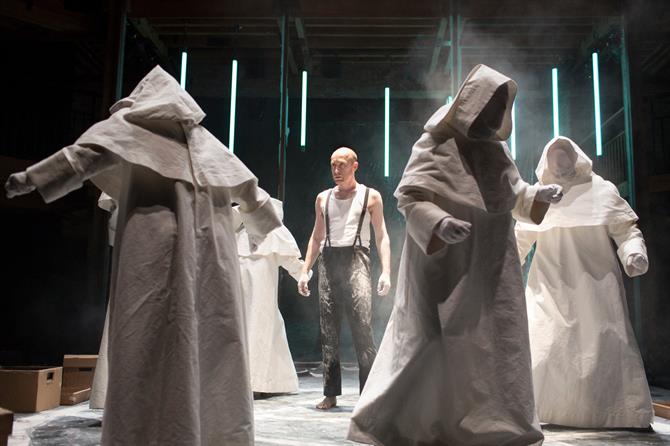
Twenty-four years fly by hellishly fast when they’re leading to a date with eternal damnation. That’s director Maria Aberg’s 105 minute, interval-less, zoom-through of Christopher Marlowe’s Doctor Faustus.
And hellish it is. Blood-stirringly and entertainingly hellish that is, full of quirky vitality and bizarre imagination. It is also on occasion confusing and distanced from Marlowe’s Renaissance questioning about science’s challenge to God.
A double vision of the play explores Faustus and the demon Mephistophilis as two sides of one character. And fittingly, the decision about which of two sleekly suited principal actors will play which, is decided at each performance by a face to face, chance contest of longest burning matches.
Set in modern dress it cuts much of the original. Gone are Faustus’s meddlings in trivial magic and awkward sub-plots of peasant humour. The basic plot remains with Doctor Faustus a brilliant scholar, feeling angry and undervalued. He wants fame, women and riches. And – frustrated at the limits of Man’s progress – he craves the key to all knowledge.
Arrogant and oddly oblivious to his fate, he summons up the demon Mephistophilis and sells his soul in exchange for a quarter century of absolute knowledge and infinite power.
Mephistophilis, however, like a demonic Arthur Daley, rarely delivers much of what he promises. Disillusioned, Faustus becomes little more than a tawdry magician performing tricks for heads of state. Awareness of his fate dawns, but fatally his own doubts and Mephistophilis’ bullying prevent him from seeking readily available divine forgiveness.
Aberg illustrates Faustus’ devilish lease with increasing illustrations of evil on earth. Assisted by Orlando Gough’s masterly, persuasive music – now lyrical with possibility, now brazenly orgiastic, now churningly frightening.
Naomi Dawson’s set is simple and effective, and the personifications of the Seven Deadly Sins – like grotesques from a Breugal painting, and the teasing of The Pope are ingeniously handled – albeit that in this dark version teasing leads to stabbing.
Many minor roles, however, are cut with their words going to members of groups of friars and scholars, so that at times it is difficult to identify who a speaker is meant to be as the inexorable dance of death proceeds. .
Oliver Ryan’s Faustus is softly spoken and introvert, yet angrily determined in pursuit of apparent logic and increasingly a nervous figure of pathos as his self-set trap springs around him.
Sandy Grierson’s Mephistophilis is less grieving fallen angel, more sinister and controlling agent of Satan. He kisses Faustus before killing him, yet there is little feeling that minds have met.
As the conjured image of Helen of Troy, Jade Croot is presented as a childlike innocent, in a strange mimed interval in which she both rejects and accepts a Faustus now desperate for comfort.
Aberg’s Faustus is a thrilling trip on a ghost train, with a destination in meaning shrouded in smoke. ★★★☆☆ Derek Briggs 10th March 2016

